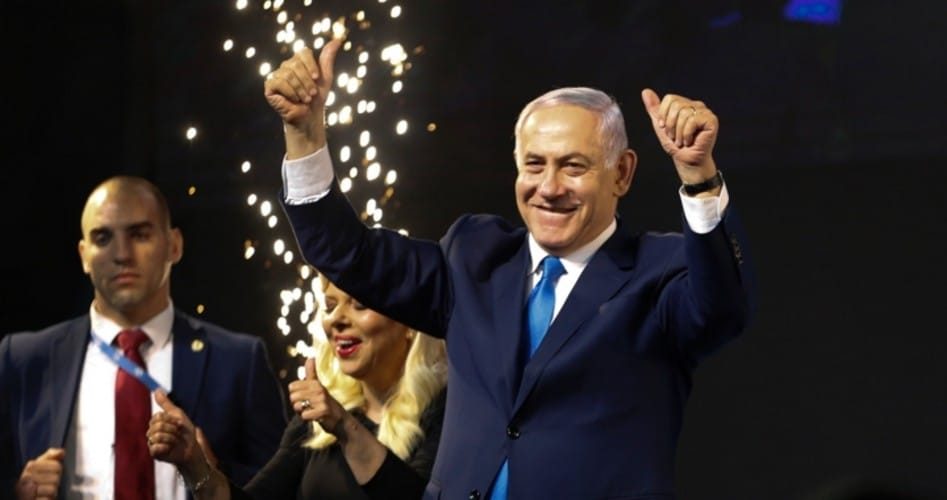
With nearly all votes counted, Israeli Prime Minister Benjamin Netanyahu and his Likud Party are the apparent winners in the snap elections in Israel. On December 24 of last year, Netanyahu called for the elections amid government gridlock and allegations of corruption against him.
Previously, Netanyahu’s coalition government held only a 61-59 majority in the Knesset, Israel’s parliament. Today’s elections have expanded that lead to 65-55. The Likud Party essentially tied the new center-left Kahol Lavan (Blue and White) Party with 35 seats apiece. The victory hinged on the percentages secured by allied parties on the right. Right-wing parties Shas and United Torah Judaism both secured eight seats. Other allied parties that secured seats were Yisrael Beiteinu (five seats), Right Wing Union (five seats) and Kulanu (five seats). Those parties have vowed to back Netanyahu for the prime minister post.
If, as expected, Netanyahu retains the prime minister position, he will become the longest serving PM in Israel’s history, surpassing the nation’s founding father David Ben-Gurion. It would be Netanyahu’s fifth term as prime minister.
“It’s a night of colossal victory,” Netanyahu told supporters in a late-night speech at the headquarters of his Likud Party.
The crowd chanted, “He’s a magician,” as Netanyahu kissed his wife Sara amid fireworks.
Netanyahu’s main rival, ex-general Benny Gantz of the Blue and White Party, addressed supporters in a letter following the results: “The skies may look overcast … but they cannot seal the sun of hope that we have brought to the Israeli people and society.”
But Gantz had no words of praise for Netanyahu. “Netanyahu collected the extremists, cannibalized his partners, and this is the result we got,” he said. During the campaign, Gantz threatened to shun Netanyahu whatever the result of the election. Gantz is expected to lead the left-wing opposition in the coming Knesset.
Palestinian Chief Negotiator Saeb Ereket was unhappy with the result as well, saying, “Israelis have voted to preserve the status quo. They have said no to peace and yes to the occupation.”
During the race, Netanyahu enraged Palestinians by promising to annex Jewish settlements in the occupied West Bank if reelected.
President Trump reacted to the Netanyahu victory, calling it “a good sign for peace.” Speaking to reporters, Trump said, “Everybody said you can’t have peace in the Middle East with Israel and the Palestinians…. I think we have a better chance now with Bibi having won.”
Some are giving Trump a great deal of credit for Netanyahu’s victory. Just two weeks ago, in a move denounced by the United Nations, the president signed a declaration that America was recognizing Israeli sovereignty over the disputed Golan Heights, which Syria also claims. Netanyahu was at the Trump’s side as he signed.
Previously, Trump moved the U.S. Embassy from Tel Aviv to Jerusalem, which prompted uproar from the international community.
As per usual, President Trump was not shy about inserting himself into the story. This morning, the president tweeted a photo of a Trump flag with his catchphrase “Make America Great Again” being waved by Netanyahu supporters during a victory celebration.
Overall, it was a contentious and vitriolic election in Israel, with both main candidates hurling accusations of corruption and incitement of bigotry at one another. Many saw the election as a referendum on Netanyahu’s previous stints as prime minister. It appears that a slim majority of Israeli citizens thought highly of Netanyahuto give him another chance.
Overshadowing Netanyahu’s victory are the charges of corruption and bribery that he may face in the coming months. Netanyahu has called the charges “outrageous” and, channeling his friend Trump, “an unprecedented witch-hunt.” He has vowed to vigorously refute the charges against him, which he has also called a “blood libel.”
Some believe that Netanyahu might pursue legislation that would render a sitting prime minister immune to indictment, though he has not announced such plans.
During the campaign, Netanyahu highlighted his close relationship with President Trump. So, in a way, the election could be seen as referendum on how the international community views Trump as well. This was also the case in Brazil, as new president Jair Bolsonaro won in 2018 after a campaign that he openly admitted was modeled after Trump’s 2016 campaign.
The mainstream media consistently tells us that President Trump is an international laughingstock. The victories of Netanyahu and Bolsonaro tell a different story.
Photo: AP Images




